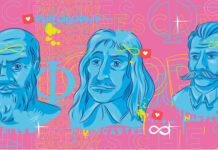“If language is inherently unstable, then how can we hope to diagnose illness accurately?” asks psychiatrist Mark Salter in an article for iai news. “Naming things, abstract or concrete, is a form of categorization,” but, he adds, “it is important to remember that our categories say more about the categorizer than the categorized.”
-
Great paragraph from the article itself, here,
“Constellation’ is a useful word. On looking into the sky on a cloudless night, the ancients saw the stars pretty much as we do today and fell back on their own cherished myths and stories to explain what they saw; The Hunter, the Great Bear, the Princess and so on. We know now that those blazing patterns of light in the night have no value or meaning in an astronomical sense. Those stars are in fact vanishingly distant balls of blazing hydrogen scattered through the galaxy and beyond that happen to fall in our line of sight. The patterns they throw on our eyes and our minds are nothing more than a reflection of our own point of view. Much the same can be said today about the way we categorise diseases of the mind. Unless our culture rediscovers the significance of the bigger world around all of us – our relationships, our air, our fibs, our myths, our habits, hopes and dreams – the journey towards diagnostic wisdom will remain stalled for some time to come.”
I have always felt this is a great analogy for illusory mental illnesses. Constellations of stars only have a relationship in that the human observer projects a connection onto certain groups of stars that don’t naturally go together. The same phenomenon applies to illusory constellations such as schizophrenia, bipolar, and borderline personality. These groupings along a continuum are not in fact more related to each other than they are to other problems/”symptoms” up or down the continuum or emotional problems.
-
I think this issue also relates to the first-person and third-person levels of analyses when it comes to understanding the mind. To me, the following ancient model of the mind makes a great deal of sense – it explains how the mind-stream manifests from moment-to-moment: http://sgo.sagepub.com/content/5/2/2158244015583860
-
At least the author acknowledged that there was corruption in the profession, and then his article sort of arcs off into outer space. I was thinking that a preferable heading might be, “Psychobabble After Postmodern Gobbledygook”














